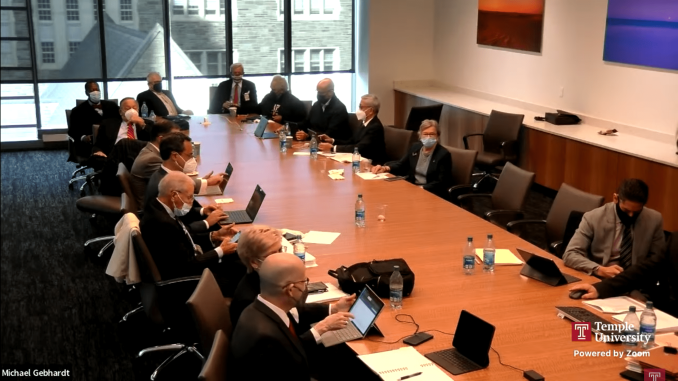
Temple University’s Board of Trustees approved an average 2.85 percent increase in room rates and 4.5 hike in board rates for the 2022-23 fiscal year at their meeting Tuesday afternoon.
On behalf of President Jason Wingard, Provost Gregory Mandel opened the meeting with updates about Temple’s COVID-19 protocols during the past three months, including the delay of in-person classes at the start of the Spring 2022 semester and the university’s new optional masking guidance. He also discussed Temple’s Strategic Planning Steering committee, mental health and wellness task force and anti-violence task force.
Here’s what happened at Tuesday’s meeting.
Housing and meal plan rates
The increase in room rates on Main Campus will range from 2.25 to 3.25 percent depending on the style, location and building amenities in each dorm. Percentage-wise, the lowest increase will be for singles in Morgan Hall North and the highest will be for double-studios in 1300 Residence Hall and quad-lounges in Johnson and Hardwick Halls.
The 4.5 percent increase in board rates represents a contractual rate increase between Temple and Aramark Corporation. The original rate hike was proposed at 6.0 percent, but Temple’s business services negotiated a decrease.
University Housing and Residential Life will have a $76.8 million budget for the 2022-23 fiscal year — a 15.5 percent increase from UHRL’s budget during the 2021-22 fiscal year. The university expects to generate more housing revenue next year by ending the COVID-19 de-densification protocols in residence halls, which have lowered the number of students allowed to live in dorms.
UHRL’s budget proposal also includes a 9.6 percent increase in salaries, wages and benefits for its staff, along with a 9.1 percent increase in spending on security and a 31.5 percent hike in funding for maintenance.
Campus development
The Board approved approximately $4.5 million in additional funding for renovations in Sullivan Hall, including constructing a third floor, modernizing the elevators, adding new roofing and financing designs for the building’s future renovations.
Trustees approved approximately $3.5 million to create an Innovation Hub on the fourth floor of the Old Dental School building at the Health Sciences Campus. The hub will support businesses “spun off by Temple’s research enterprise,” and the funding will be used to build and renovate office space, meeting space, labs and computational rooms.
Trustees approved nearly $800,000 for expanding the Aramark STAR Complex, which will create areas within the building for the university’s rowing, fencing, wrestling and golf teams. The teams currently practice in the Student Pavilion on 15th Street near Norris, which will be demolished in a future project to create a new building for the Klein College of Media and Communication and Center for the Performing and Cinematic Arts.
The Board also approved funding for renovations to the sewers in Temple Towers, a vacant computer lab in the Old Dental School, the restrooms in Mazur Hall and the elevator lobbies in Conwell Hall.
Appointments and academic affairs
Trustees approved the re-election of Commonwealth Trustee Patrick Larkin, and approved the nomination of Daniel Polett, a former Board of Trustees chairman and Polett Walk’s namesake, as an honorary life trustee. The Board also approved four officer appointments and three title adjustments for senior administrators.
Additionally, the board approved major gifts, established, restructured and terminated various programs and approved the dates on degrees for students in Podiatric Medicine, Dentistry, Law, Medicine and Pharmacy and students at Temple’s Japan campus.
Closing remarks
Faculty Senate President Kimmika Williams-Witherspoon shared that Wingard asked the Faculty Senate Steering Committee to create a proposal showing how the Faculty Senate can serve as a strategic advisor to the university. The committee submitted their proposal to Wingard in February.
Student Body President Bradley Smutek delivered his final remarks to the board, summarizing his administration’s accomplishments throughout the year. He urged the Trustees to support Student Affairs in establishing a permanent interfaith prayer space for students, mandate booster doses of the COVID-19 vaccine, implement Wellness Days and invite a student, not involved in Temple Student Government, to sit and vote with the Board.



Be the first to comment